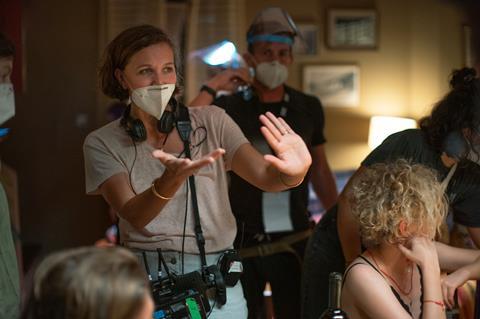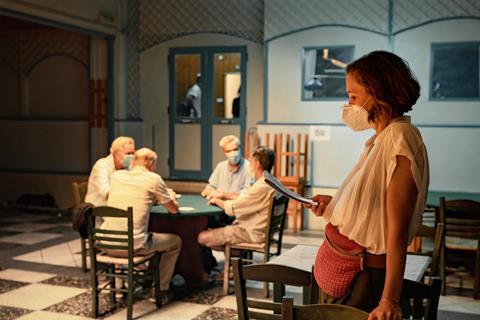The Netflix drama derives from breaking a taboo about parenting. Talking to Screen, the debut feature director discusses taking on subject matter that is “shatteringly truthful”.

“I know I want to be a director. I know I want to write. And I don’t know if I want to keep acting. I guess that’s the truth.” Maggie Gyllenhaal is only five minutes into her conversation with Screen International before confirming her reputation as someone who is not shy of telling it like it is.
Gyllenhaal is justifiably pleased with her new incarnation, given the seemingly joyful experience of making The Lost Daughter and the film’s success — with prizes from Venice Film Festival to the Gothams. And it has understandably made her reflect on what has been nearly two decades in front of the camera.
The fruits of that career are impressive, from independents Secretary and Sherrybaby, a franchise outing in The Dark Knight and her Oscar- nominated performance in Crazy Heart, to sterling TV work such as The Deuce. But Gyllenhaal’s perspective is not all sunshine and roses.
“I found my way through as an actress,” she says. “I remember reading this thing that Meryl Streep said, or supposedly said, that if you have an idea as an actress that you need artistically, in order to do the scene, ask for it with a spoonful of sugar. I took that advice, and I found it useful, but it’s also a lot of work, you know, navigating. There are not that many people who are interested in actresses’ ideas, and I think I got tired of that extra, unnecessary work.”
For her first feature as director, Gyllenhaal says, “I tried to create a set — and I think I did, it was very important to me — where no-one had to come to me with a spoonful of bullshit sugar. I was interested in their ideas, and they’re all over my movie.”
Adapted from the novel by the pseudonymous, almost mythical Italian writer Elena Ferrante, The Lost Daughter is in keeping with Gyllenhaal’s defining choices as an actress: it is a challenging, discomforting film, willing to mine a theme that is difficult, even taboo.
A committed fan of Ferrante’s writing, Gyllenhaal settled on the story of fortysomething comparative literature professor Leda, whose solo holiday is disrupted when she meets Nina, a struggling young mother, sparking memories of her own parental conflict and extreme solution years before. Olivia Colman plays Leda in the present, Jessie Buckley the character viewed in flashback in her 20s, Dakota Johnson the catalyst for some intense soul-searching.
“What I’m looking for in a script, as an actress or as a director, is something truthful,” says Gyllenhaal. “And the thing about this book is that it’s kind of shatteringly truthful. All these things that women have agreed not to talk about, aspects of our experience — Ferrante broke that agreement.”
The mother of two readily admits that “parenting will bring you to your knees”, a fact the pandemic has underlined for many families. “It’s not just the sitcom version of ‘Oh, she’s got apple sauce on her shirt and she’s tired.’ There’s also real terror, despair, anxiety, exhaustion and, you know, heart-wrenching joy, that I believe is a part of the normal, garden-variety parenting experience.
“There’s something very compelling about cracking open a taboo,” she adds. “That was one of the things that appealed to me about this. Not just for the sake of cracking it open, but if it’s for the sake of truth, then all of a sudden you really do have an inherently dramatic situation.”
Partnering up
Gyllenhaal recognises now that “I always wanted to direct”, but getting there was a gradual process — along with the right source material, finding like-minded producers was key to the ambition being fulfilled.
“I had worked with two wonderful producers on The Kindergarten Teacher, Osnat Handelsman-Keren and Talia Kleinhendler [both of Tel Aviv-based Pie Films], who produced that film with me. I learned a ton from them, and we had a connection. In fact, they were impactful on me deciding to direct. They knew it was on my mind, and they just kept saying, ‘You’re a director, we see you’re a director. Let’s go.’ So we were together from the beginning.”

With Ferrante approving the rights and Colman and Buckley on board, financing was secured from Endeavour Content and Samuel Marshall Films — with Netflix later acquiring various territory rights including the US in August 2021, picking up more countries including the UK two months later.
The completed cast included Ed Harris, Normal People breakout star Paul Mescal and Gyllenhaal’s husband Peter Sarsgaard in a small but pivotal role.
Originally Gyllenhaal’s script had relocated the Italy-set story to the US and, largely for budgetary reasons, New Jersey was earmarked for the shoot. Then coronavirus struck offering a new opportunity. “New Jersey had horrible [Covid-19] numbers. It was awful. And it was never right. I said, ‘I’m sorry, but no matter what, I don’t want to shoot in New Jersey.’ It was one of the first moves that I made as the director.”
Canada was Covid-shy of an international cast and crew, while Gyllenhaal was not sure she understood UK culture well enough to locate the story there. “Then one day, I don’t know where it came from, my unconscious really, I said, ‘You know, I could do it in Greece.’ And as soon as I did that, we were kind of unstoppable. Greece has a great film infrastructure, great tax incentive, it worked with our budget, and it worked with my heart.”
As did her casting. Gyllenhaal has spoken of having felt a “cosmic connection” when thinking of Colman for a role that was new territory for the actress, but which needed her innate humour and likeability to leaven Leda’s darker side. It was Colman who then suggested Buckley, and when Gyllenhaal watched Wild Rose she was sold. “There are a lot of good actresses of that age, but just a couple of brilliant ones, and she’s one of them.” The director was not interested in having the pair match mannerisms across the decades, relying on two “formidable” actresses and a “poetic agreement” with the audience to accept them as one.
Shortly before the shoot, Gyllenhaal sharpened her directing skills by contributing a short film to the Netflix anthology of pandemic- themed stories, Homemade, with Sarsgaard the only actor on screen (“I love watching him. I’m going to put him in everything”) and filmed at their home in Vermont.
“We shot it in a day and a half. We [only] had a crew of four people, including me and Peter. But I learned so many things. One is that I need a monitor in my hands all the time. I love a monitor. In Greece I crouched on the ground as close as I could to the actors, so I could kind of feel them. But I watched the scene on my monitor. I needed to see it framed.”
While agreeing the 28-day shoot on the island of Spetses was a “baptism by fire”, Gyllenhaal also recalls a text she sent her husband on the first day: “This is hard work heaven.”
In the edit, she found a valuable source of feedback in her Homemade producer Pablo Larrain. “I showed him an early cut of the film. He said, ‘Don’t fuck around with me, give me a real, full ending. Don’t be coy.’ Which is a great note. And I did it. I owe him a thank you.”
Gyllenhaal is now thinking about her wider, particularly female audience. “I’m hoping the film can reach people who are never going to read Ferrante — it’s not their thing, not their vibe — but still are women who I think would be comforted and opened up by hearing some of these truthful things.”

























No comments yet